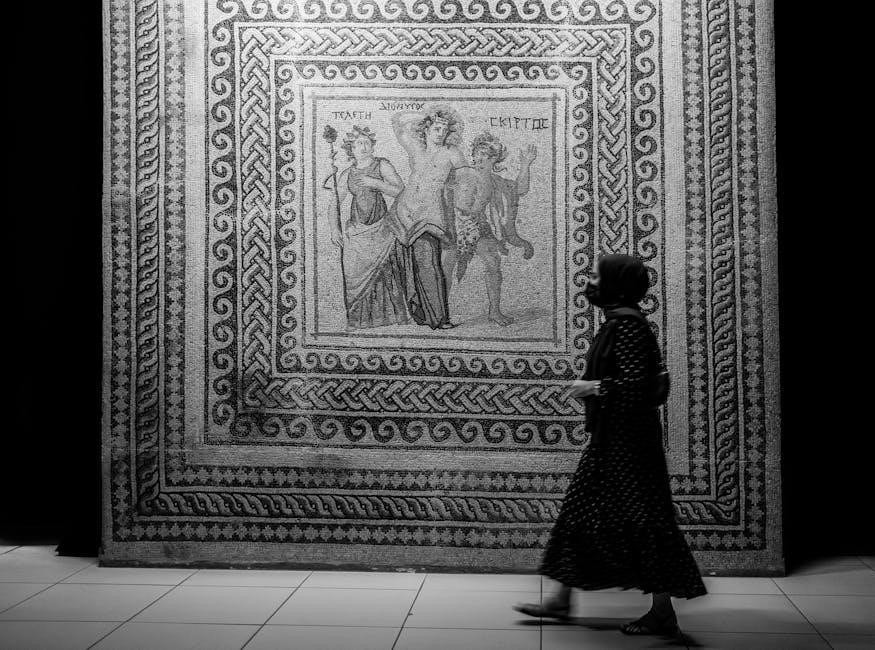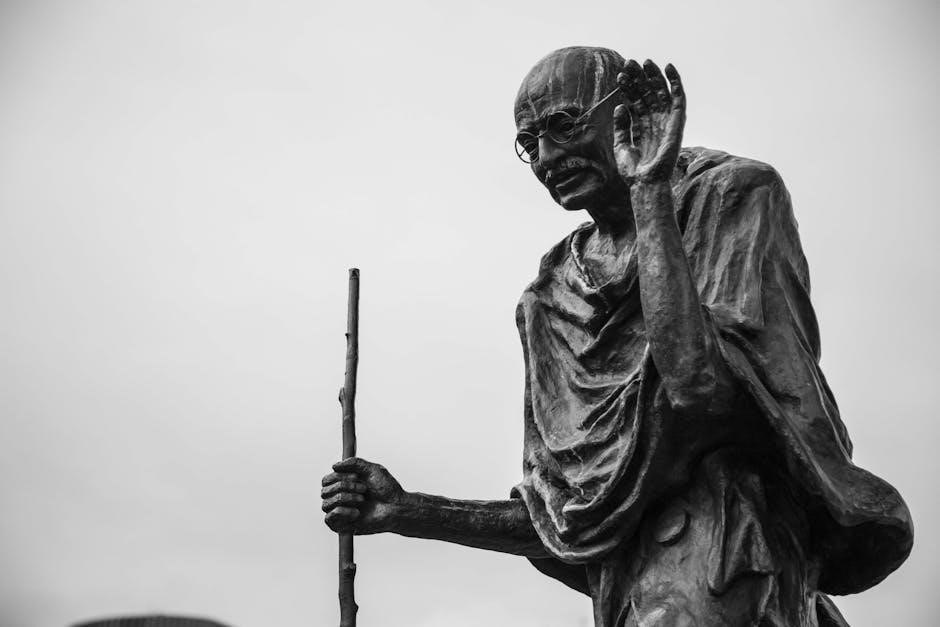“A Brief History of Thought: A Philosophical Guide to Living” offers an accessible overview of Western philosophy, tracing its evolution from ancient Greece to modern times.
Overview of “A Brief History of Thought”
“A Brief History of Thought” provides a comprehensive yet accessible exploration of Western philosophy, spanning from ancient Greece to modern times. The book guides readers through key philosophical movements, including Christianity, the Enlightenment, existentialism, and postmodernism. It serves as both a historical overview and a practical guide, helping readers apply timeless insights to contemporary life. Luc Ferry’s engaging narrative makes complex ideas relatable for a broad audience.
The Author’s Perspective on Philosophy
Luc Ferry, the author of A Brief History of Thought, approaches philosophy as a tool for understanding life’s meaning and ethical living. He emphasizes the relevance of philosophical ideas to contemporary challenges, offering a synthesis of major Western philosophical traditions. Ferry’s perspective bridges the gap between academic philosophy and everyday life, making complex concepts accessible to readers without a philosophical background. His engaging narrative style ensures the book is both informative and inspiring, encouraging readers to reflect on their own existence and values.

Ancient Greek Philosophy
Ancient Greek philosophy laid the foundation of Western thought, with Socrates, Plato, and Aristotle shaping ideas about reality, ethics, and human nature that endure to this day.
The Socratic Method and Its Influence
The Socratic Method, developed by Socrates, emphasizes questioning to stimulate critical thinking and expose underlying assumptions. Through dialogue, it encourages self-reflection and intellectual humility, shaping Western education and philosophical inquiry. This approach remains foundational in fostering analytical skills and ethical reasoning, influencing thinkers across centuries and continuing to inspire modern pedagogical practices.
Plato’s Theory of Forms and Its Legacy
Plato’s Theory of Forms posits that non-material abstract forms represent the most accurate reality, with the physical world being mere shadows. This concept has profoundly influenced Western philosophy, shaping metaphysics, epistemology, and theology. It laid the groundwork for Platonic realism and continues to inspire debates on the nature of reality and knowledge, remaining a cornerstone of philosophical thought for centuries.
Aristotle’s Contributions to Western Thought
Aristotle’s empirical approach and concept of causality revolutionized philosophy and science. His works spanned logic, metaphysics, ethics, and biology, establishing foundational principles for scientific inquiry. His ethical ideas, such as the mean and eudaimonia, remain central to moral philosophy. Aristotle’s legacy shaped Scholasticism and continues to influence modern thought, offering insights into human nature and the pursuit of happiness.
The Christian Era and Its Philosophical Impact
The Christian era profoundly shaped philosophy by integrating faith and reason, influencing ethics and metaphysics. Augustine’s synthesis of Christian theology with classical thought laid the groundwork for medieval philosophy.
Augustine’s Synthesis of Faith and Reason
Augustine merged Christian theology with classical philosophy, emphasizing the harmony between faith and reason. His works, such as Confessions and The City of God, explored human nature, morality, and divine providence. Augustine’s ideas on original sin, free will, and the divine city shaped medieval thought, bridging ancient philosophy with Christian doctrine, and remain central to Western philosophical and theological traditions.
The Role of Theology in Shaping Medieval Thought
Theology dominated medieval philosophy, as scholars sought to reconcile faith with reason. The Church’s authority influenced debates on morality, metaphysics, and human existence. Thinkers like Thomas Aquinas integrated Aristotelian logic with Christian doctrine, creating a synthesis that shaped scholasticism. Theology’s central role emphasized the study of scripture and divine truths, forming the foundation of medieval intellectual life and guiding ethical and philosophical inquiry during this period.
The Enlightenment and Its Key Thinkers
The Enlightenment emphasized reason and individualism, led by thinkers like Descartes, Rousseau, and Kant, who reshaped philosophy, politics, and morality, laying the groundwork for modern thought.
Descartes and the Foundations of Modern Philosophy
René Descartes laid the groundwork for modern philosophy with his methodological skepticism and famous declaration, “I think, therefore I am.” His emphasis on reason and individual thought challenged traditional authority, establishing the mind-body dualism and influencing Enlightenment thinkers. Descartes’ rationalist approach reshaped metaphysics, epistemology, and science, making him a cornerstone of Western philosophical development.
Rousseau’s Ideas on Society and Human Nature
Jean-Jacques Rousseau argued that humans are inherently good but corrupted by society, advocating for a return to nature. His concept of the “general will” in The Social Contract proposed that true sovereignty lies with the people, influencing modern democratic thought. Rousseau’s critique of civilization and emphasis on moral freedom reshaped Enlightenment ideals, leaving a lasting impact on political and social philosophy.
Kant’s Moral Philosophy and Its Enduring Influence
Immanuel Kant’s moral philosophy, centered on deontological ethics, emphasizes duty and universal moral laws. His “categorical imperative” posits that actions should be judged by their adherence to maxims capable of becoming universal laws. Kant argued that morality stems from reason, not emotion, and that individuals should treat others as ends in themselves, not means to an end. His ideas profoundly shaped modern ethical thought and continue to influence philosophy, law, and human rights.
19th Century Thought
The 19th century saw the rise of influential philosophers like Hegel, Marx, Kierkegaard, and Nietzsche, whose ideas reshaped modern thought, politics, and existentialism.
Hegel’s Dialectical Approach to History
Hegel’s dialectical method explores historical development through the conflict of opposing forces, or thesis and antithesis, leading to a higher synthesis. This process, seen as inevitable, drives progress in consciousness and freedom. His philosophy emphasizes the unity of contradictions, shaping modern understandings of change and evolution. Hegel’s ideas deeply influenced later thinkers, including Marx, and remain central to discussions of historical and philosophical progress.
Marx’s Critique of Capitalism and Society
Marx’s critique of capitalism centers on class struggle and economic inequality. He argued that capitalism alienates workers, reducing labor to a commodity. Marx envisioned a classless society through revolutionary change, influencing modern socialism and political theory. His ideas remain pivotal in debates about economic systems, social justice, and the structure of power, shaping critiques of capitalism and inspiring movements for social transformation and equality.
Kierkegaard and the Rise of Existentialism
Søren Kierkegaard, often called the father of existentialism, emphasized individual subjectivity and personal choice. He critiqued societal norms and the Church, advocating for authentic, passionate existence. His concept of the “leap of faith” underscores the tension between reason and belief. Kierkegaard’s philosophy laid the groundwork for modern existential thought, influencing thinkers like Nietzsche and Sartre, and remains central to debates on identity, meaning, and the human condition.
Nietzsche’s Challenge to Traditional Morality
Friedrich Nietzsche famously declared the “death of God,” rejecting traditional morality as a construct of religious and cultural conditioning. He argued that conventional moral systems stifle individual creativity and excellence, advocating instead for the “will to power” and the Übermensch (Overman). Nietzsche’s critique of morality as a form of “slave ethics” challenged readers to embrace life’s ambiguity and forge their own values, profoundly influencing existentialism and postmodern thought.
20th Century Philosophy
The 20th century explored Phenomenology, Existentialism, and Postmodernism, reshaping understandings of human existence and reality. Thinkers like Husserl, Heidegger, and Sartre focused on consciousness and freedom, while Postmodernism challenged traditional notions of truth and knowledge, influencing contemporary thought profoundly.
Phenomenology and Existentialism
Phenomenology, led by Edmund Husserl, focused on conscious experience, seeking to understand phenomena as they appear to consciousness. Existentialism, through thinkers like Martin Heidegger and Jean-Paul Sartre, emphasized individual freedom, authenticity, and the inherent meaninglessness of life, asserting that humans must create their own purpose. Together, these movements reshaped modern philosophy, prioritizing subjective experience and human existence over traditional metaphysics and epistemology.
Postmodernism and Its Critics
Postmodernism challenged grand narratives, embracing diversity and questioning objective truth. Thinkers like Jacques Derrida and Michel Foucault emphasized deconstruction and power dynamics, rejecting universal truths. Critics argue postmodernism undermines rationality and moral frameworks, leading to relativism. Despite this, it remains influential, highlighting the fragmented nature of contemporary thought and encouraging a critical view of established knowledge and authority structures in society.

Modern and Contemporary Thought
Exploring the evolution of human intelligence, A Brief History of Thought examines contemporary models, from Kriya-Pratikriya to modern frameworks, offering insights into philosophy’s role in understanding thought processes.
The Evolution of Human Intelligence Models
This section delves into the evolution of human intelligence models, tracing from ancient concepts like Kriya-Pratikriya to contemporary cognitive frameworks. It analyzes how these models have influenced our understanding of thought processes and their modern applications. A Brief History of Thought bridges historical theories with current understanding, providing insights into how these frameworks shape our perception of intelligence and inform philosophical inquiry today.
The Role of Philosophy in Understanding Thought Processes
Philosophy plays a pivotal role in exploring the nature of thought, offering frameworks to examine cognition, reasoning, and consciousness. From ancient Greek inquiry to modern theories, it provides tools to dissect the complexities of human thought. By analyzing concepts like mind-body dualism and existential awareness, philosophy bridges theory with practical insights, helping us better understand and navigate our mental landscapes in pursuit of deeper self-awareness and wisdom.

Key Concepts in the History of Thought
A Brief History of Thought explores major theories, tracing thought from ancient wisdom to modern applications, providing a structured journey through timeless ideas and contemporary life.
From Ancient Wisdom to Modern Applications
A Brief History of Thought bridges ancient philosophical ideas with contemporary relevance, showing how timeless concepts like ethics and reason continue to shape modern understanding and living.

The Evolution of Human Thought Processes
From ancient Greek wisdom to modern philosophical frameworks, human thought has evolved, refining ideas and applications across centuries, shaping understanding and guiding contemporary thinking.
From Kriya-Pratikriya to Contemporary Models
Exploring the journey from ancient concepts like Kriya-Pratikriya to modern philosophical frameworks, this section delves into how human thought processes have evolved over time. It examines the transition from traditional action-reaction models to contemporary theories, such as phenomenology and existentialism, highlighting their relevance in understanding human behavior and cognition. This evolution underscores the dynamic nature of philosophical thought in addressing life’s complexities.
A Philosophical Guide to Living
“A Brief History of Thought” offers insights into ethics, self-discovery, and life’s meaning, blending timeless wisdom with practical advice for navigating modern existence.
Ethics, Self-Discovery, and the Meaning of Life
“A Brief History of Thought” delves into the essence of ethics, self-discovery, and life’s purpose, blending ancient wisdom with modern philosophical insights. Ferry explores how ethics shape human behavior and societal norms, while emphasizing self-discovery as a path to understanding one’s place in the world. The book encourages readers to reflect on life’s meaning, drawing from historical perspectives to navigate contemporary existential questions, making it a valuable guide for thoughtful living.
The Relevance of Philosophical History in Modern Life
Philosophical history provides timeless wisdom, offering insights into contemporary challenges. It bridges ancient ideas with modern issues, enabling readers to apply enduring truths to today’s complex world.
Applying Timeless Wisdom to Contemporary Challenges
The book bridges ancient philosophical insights with modern dilemmas, offering readers a framework to navigate today’s complexities. By exploring foundational ideas from Descartes to Nietzsche, it illustrates how historical thought can illuminate contemporary ethical, social, and existential questions, providing a rich tapestry of wisdom to address the challenges of our rapidly changing world.
“A Brief History of Thought” concludes with a synthesis of timeless ideas, bridging ancient wisdom with modern reflections, inspiring readers to embrace philosophy as a guide for living meaningfully.
Summarizing the Journey Through Philosophical Thought
“A Brief History of Thought” masterfully traces the evolution of philosophical ideas from ancient Greece to contemporary times, weaving together diverse perspectives. It explores the transition from Greek rationalism to Christian synthesis, the Enlightenment’s emphasis on reason, and the rise of existentialism and postmodernism. By connecting these milestones, the book underscores philosophy’s enduring relevance, offering readers a cohesive narrative to navigate life’s complexities and uncover timeless wisdom.
Further Reading and Resources
Explore more on “A Brief History of Thought” through online platforms like Perlego, offering unlimited access to academic and non-fiction books for deeper philosophical insights.
Exploring the Works Mentioned in the Book
The book references seminal works by Plato, Aristotle, Descartes, and Nietzsche, among others, offering readers a foundation for further exploration of these philosophers’ ideas.
Online platforms like Perlego provide access to these texts, enabling readers to delve deeper into the theories and concepts discussed in “A Brief History of Thought.”
Supplementing the book with original works enhances understanding of the philosophical journey from ancient Greece to modern thought.
